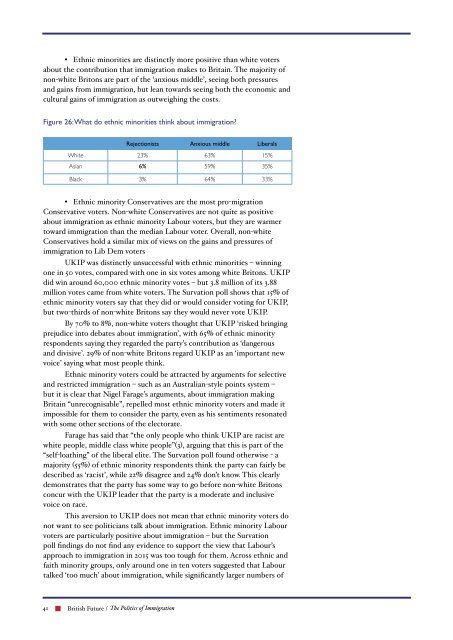THE POLITICS OF IMMIGRATION
The-politics-of-immigration
The-politics-of-immigration
Create successful ePaper yourself
Turn your PDF publications into a flip-book with our unique Google optimized e-Paper software.
• Ethnic minorities are distinctly more positive than white voters<br />
about the contribution that immigration makes to Britain. The majority of<br />
non-white Britons are part of the ‘anxious middle’, seeing both pressures<br />
and gains from immigration, but lean towards seeing both the economic and<br />
cultural gains of immigration as outweighing the costs.<br />
Figure 26: What do ethnic minorities think about immigration?<br />
Rejectionists Anxious middle Liberals<br />
White 23% 63% 15%<br />
Asian 6% 59% 35%<br />
Black 3% 64% 33%<br />
• Ethnic minority Conservatives are the most pro-migration<br />
Conservative voters. Non-white Conservatives are not quite as positive<br />
about immigration as ethnic minority Labour voters, but they are warmer<br />
toward immigration than the median Labour voter. Overall, non-white<br />
Conservatives hold a similar mix of views on the gains and pressures of<br />
immigration to Lib Dem voters<br />
UKIP was distinctly unsuccessful with ethnic minorities – winning<br />
one in 50 votes, compared with one in six votes among white Britons. UKIP<br />
did win around 60,000 ethnic minority votes – but 3.8 million of its 3.88<br />
million votes came from white voters. The Survation poll shows that 15% of<br />
ethnic minority voters say that they did or would consider voting for UKIP,<br />
but two-thirds of non-white Britons say they would never vote UKIP.<br />
By 70% to 8%, non-white voters thought that UKIP ‘risked bringing<br />
prejudice into debates about immigration’, with 65% of ethnic minority<br />
respondents saying they regarded the party’s contribution as ‘dangerous<br />
and divisive’. 29% of non-white Britons regard UKIP as an ‘important new<br />
voice’ saying what most people think.<br />
Ethnic minority voters could be attracted by arguments for selective<br />
and restricted immigration – such as an Australian-style points system –<br />
but it is clear that Nigel Farage’s arguments, about immigration making<br />
Britain “unrecognisable”, repelled most ethnic minority voters and made it<br />
impossible for them to consider the party, even as his sentiments resonated<br />
with some other sections of the electorate.<br />
Farage has said that “the only people who think UKIP are racist are<br />
white people, middle class white people”(3), arguing that this is part of the<br />
“self-loathing” of the liberal elite. The Survation poll found otherwise - a<br />
majority (55%) of ethnic minority respondents think the party can fairly be<br />
described as ‘racist’, while 22% disagree and 24% don’t know. This clearly<br />
demonstrates that the party has some way to go before non-white Britons<br />
concur with the UKIP leader that the party is a moderate and inclusive<br />
voice on race.<br />
This aversion to UKIP does not mean that ethnic minority voters do<br />
not want to see politicians talk about immigration. Ethnic minority Labour<br />
voters are particularly positive about immigration – but the Survation<br />
poll findings do not find any evidence to support the view that Labour’s<br />
approach to immigration in 2015 was too tough for them. Across ethnic and<br />
faith minority groups, only around one in ten voters suggested that Labour<br />
talked ‘too much’ about immigration, while significantly larger numbers of<br />
41 British Future / The Politics of Immigration


